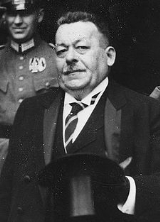
List of German presidents since 1919
Encyclopedia
A number of presidential offices have existed in Germany
since the fall of the monarchy in 1918. During the 1919-1933 Weimar Republic
the head of state
was the President of Germany . Upon the death of Paul von Hindenburg
in August 1934 the office was left vacant, with Adolf Hitler
becoming head of state as Führer und Reichskanzler. In 1945, Karl Dönitz
briefly became President.
The West German constitution (Grundgesetz or Basic Law) of May 1949 created the office of President of Germany
. Since Germany was reunited in 1990 the President has been the head of state for all of Germany.
The East German constitution of October 1949 created the office of Präsident der Deutschen Demokratischen Republik (DDR) ("President of the German Democratic Republic"). Upon the death of Wilhelm Pieck
in 1960, the office of Präsident der DDR was abolished and replaced by a collective head of state, the Staatsrat (State Council). The Staatsrat was abolished by a constitutional amendment of the Volkskammer
("People's Chamber") on 5 April 1990. From then until the GDR joined the Federal Republic on 3 October 1990, the president of the Volkskammer also served as the GDR head of state.
Also, between 1947 and 1956, the Saar
was a French protectorate before it joined West Germany as a Land.
Presidents of the German Reich
As Chancellor of Germany
.
As President of the Reichsgericht
.
As President of the People's Chamber.
As Deputy Chairman of the State Council.
List of Presidents of the reunified
As President of the Bundesrat, Böhrnsen served as acting President following the resignation of Horst Köhler
.
Germany
Germany , officially the Federal Republic of Germany , is a federal parliamentary republic in Europe. The country consists of 16 states while the capital and largest city is Berlin. Germany covers an area of 357,021 km2 and has a largely temperate seasonal climate...
since the fall of the monarchy in 1918. During the 1919-1933 Weimar Republic
Weimar Republic
The Weimar Republic is the name given by historians to the parliamentary republic established in 1919 in Germany to replace the imperial form of government...
the head of state
Head of State
A head of state is the individual that serves as the chief public representative of a monarchy, republic, federation, commonwealth or other kind of state. His or her role generally includes legitimizing the state and exercising the political powers, functions, and duties granted to the head of...
was the President of Germany . Upon the death of Paul von Hindenburg
Paul von Hindenburg
Paul Ludwig Hans Anton von Beneckendorff und von Hindenburg , known universally as Paul von Hindenburg was a Prussian-German field marshal, statesman, and politician, and served as the second President of Germany from 1925 to 1934....
in August 1934 the office was left vacant, with Adolf Hitler
Adolf Hitler
Adolf Hitler was an Austrian-born German politician and the leader of the National Socialist German Workers Party , commonly referred to as the Nazi Party). He was Chancellor of Germany from 1933 to 1945, and head of state from 1934 to 1945...
becoming head of state as Führer und Reichskanzler. In 1945, Karl Dönitz
Karl Dönitz
Karl Dönitz was a German naval commander during World War II. He started his career in the German Navy during World War I. In 1918, while he was in command of , the submarine was sunk by British forces and Dönitz was taken prisoner...
briefly became President.
The West German constitution (Grundgesetz or Basic Law) of May 1949 created the office of President of Germany
President of Germany
The President of the Federal Republic of Germany is the country's head of state. His official title in German is Bundespräsident . Germany has a parliamentary system of government and so the position of President is largely ceremonial...
. Since Germany was reunited in 1990 the President has been the head of state for all of Germany.
The East German constitution of October 1949 created the office of Präsident der Deutschen Demokratischen Republik (DDR) ("President of the German Democratic Republic"). Upon the death of Wilhelm Pieck
Wilhelm Pieck
Friedrich Wilhelm Reinhold Pieck was a German politician and a Communist. In 1949, he became the first President of the German Democratic Republic, an office abolished upon his death. He was succeeded by Walter Ulbricht, who served as Chairman of the Council of States.-Biography:Pieck was born to...
in 1960, the office of Präsident der DDR was abolished and replaced by a collective head of state, the Staatsrat (State Council). The Staatsrat was abolished by a constitutional amendment of the Volkskammer
Volkskammer
The People's Chamber was the unicameral legislature of the German Democratic Republic . From its founding in 1949 until the first free elections on 18 March 1990, all members of the Volkskammer were elected on a slate controlled by the Socialist Unity Party of Germany , called the National Front...
("People's Chamber") on 5 April 1990. From then until the GDR joined the Federal Republic on 3 October 1990, the president of the Volkskammer also served as the GDR head of state.
Also, between 1947 and 1956, the Saar
Saar
- Places :*Saar Region and Saar Area— in context, any of the below:*#Saar , or Saar River valley — an important navigable river running through the borderlands of France and Germany through a mineral rich, highly developed, industrial region once part of the pre-Napoleonic state of ...
was a French protectorate before it joined West Germany as a Land.
Presidents of the German ReichWeimar RepublicThe Weimar Republic is the name given by historians to the parliamentary republic established in 1919 in Germany to replace the imperial form of government...
(Reichspräsidenten) (1919-1945)
| # | Portrait | Name (Born-Died) |
Term of Office | Party | |
|---|---|---|---|---|---|
| 1 | 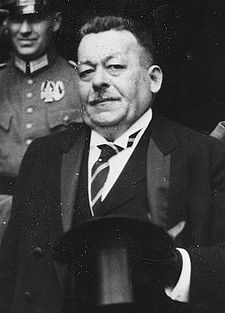 |
Friedrich Ebert Friedrich Ebert Friedrich Ebert was a German politician of the Social Democratic Party of Germany .When Ebert was elected as the leader of the SPD after the death of August Bebel, the party members of the SPD were deeply divided because of the party's support for World War I. Ebert supported the Burgfrieden and... (1871–1925) |
11 February 1919 | 28 February 1925 (died in office) |
SPD Social Democratic Party of Germany The Social Democratic Party of Germany is a social-democratic political party in Germany... |
| – |  |
Hans Luther Hans Luther Hans Luther was a German politician and Chancellor of Germany.-Biography:Born in Berlin, Luther started in politics in 1907 by becoming the town councillor in Magdeburg. He continued on becoming secretary of the German Städtetag in 1913 and then mayor of Essen in 1918... (acting) (1879–1962) |
28 February 1925 | 12 March 1925 | Non-partisan |
| – | Walter Simons Walter Simons Walter Simons was a German lawyer and politician. He served as president of the Reichsgericht from 1922 to 1929.-Biography:Walter Simons was a student of the jurist Rudolph Sohm, and was influenced by Humanism and Lutheran Pietism... (acting) (1861–1937) |
12 March 1925 | 12 May 1925 | Non-partisan | |
| 2 |  |
General Field Marshal Paul von Hindenburg Paul von Hindenburg Paul Ludwig Hans Anton von Beneckendorff und von Hindenburg , known universally as Paul von Hindenburg was a Prussian-German field marshal, statesman, and politician, and served as the second President of Germany from 1925 to 1934.... (1847-1934) |
12 May 1925 | 2 August 1934 (died in office) |
Non-partisan |
| 3 | Adolf Hitler Adolf Hitler Adolf Hitler was an Austrian-born German politician and the leader of the National Socialist German Workers Party , commonly referred to as the Nazi Party). He was Chancellor of Germany from 1933 to 1945, and head of state from 1934 to 1945... (1889–1945) (Head of state and government as Führer und Reichskanzler) |
2 August 1934 | 30 April 1945 (died in office Death of Adolf Hitler Adolf Hitler committed suicide by gunshot on Monday, 30 April 1945 in his Führerbunker in Berlin. His wife Eva , committed suicide with him by ingesting cyanide... ) |
NSDAP National Socialist German Workers Party The National Socialist German Workers' Party , commonly known in English as the Nazi Party, was a political party in Germany between 1920 and 1945. Its predecessor, the German Workers' Party , existed from 1919 to 1920... |
|
| 4 | 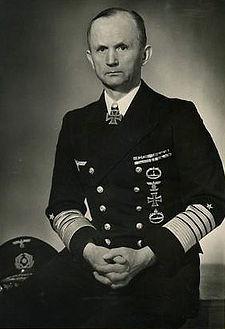 |
Grand Admiral Grand Admiral Grand admiral is a historic naval rank, generally being the highest such rank present in any particular country. Its most notable use was in Germany — the German word is Großadmiral.-France:... Karl Dönitz Karl Dönitz Karl Dönitz was a German naval commander during World War II. He started his career in the German Navy during World War I. In 1918, while he was in command of , the submarine was sunk by British forces and Dönitz was taken prisoner... (1891–1980) |
30 April 1945 | 23 May 1945 | NSDAP National Socialist German Workers Party The National Socialist German Workers' Party , commonly known in English as the Nazi Party, was a political party in Germany between 1920 and 1945. Its predecessor, the German Workers' Party , existed from 1919 to 1920... |
As Chancellor of Germany
Chancellor of Germany
The Chancellor of Germany is, under the German 1949 constitution, the head of government of Germany...
.
As President of the Reichsgericht
Reichsgericht
The Reichsgericht was the highest court of the Deutsches Reich. It was established on October 1, 1879 when the Reichsjustizgesetze came into effect, building a widely regarded body of jurisprudence....
.
Presidents of Partitioned Germany (1949–1990)
Presidents of the Federal Republic of Germany
|
|||||
| # | Picture | Name (Born-Died) |
Term of Office | Party | |
|---|---|---|---|---|---|
| – | Karl Arnold (acting) (1901–1958) |
7 September 1949 | 12 September 1949 | CDU Christian Democratic Union (Germany) The Christian Democratic Union of Germany is a Christian democratic and conservative political party in Germany. It is regarded as on the centre-right of the German political spectrum... |
|
| 1 |  |
Theodor Heuss Theodor Heuss Theodor Heuss was a liberal German politician who served as the first President of the Federal Republic of Germany after World War II from 1949 to 1959... (1884–1963) |
13 September 1949 | 12 September 1959 | FDP Free Democratic Party (Germany) The Free Democratic Party , abbreviated to FDP, is a centre-right classical liberal political party in Germany. It is led by Philipp Rösler and currently serves as the junior coalition partner to the Union in the German federal government... |
| 2 |  |
Heinrich Lübke Heinrich Lübke Karl Heinrich Lübke was President of the Federal Republic of Germany from 1959 to 1969.-Biography:... (1894–1972) |
13 September 1959 | 30 June 1969 (resigned) |
CDU Christian Democratic Union (Germany) The Christian Democratic Union of Germany is a Christian democratic and conservative political party in Germany. It is regarded as on the centre-right of the German political spectrum... |
| 3 |  |
Gustav Heinemann Gustav Heinemann Gustav Walter Heinemann, GCB was a German politician. He was Mayor of the city of Essen from 1946 to 1949, West German Minister of the Interior from 1949 to 1950, Minister of Justice from 1966 to 1969 and President of the Federal Republic of Germany from 1969 to 1974.-Early years and professional... (1899–1976) |
1 July 1969 | 30 June 1974 | SPD |
| 4 |  |
Walter Scheel Walter Scheel Walter Scheel is a German politician . He served as Federal Minister of Economic Cooperation and Development from 1961 to 1966, Foreign Minister of Germany and Vice Chancellor from 1969 to 1974, acting Chancellor of Germany from 7 May to 16 May 1974 , and finally as President of the Federal... (b. 1919) |
1 July 1974 | 30 June 1979 | FDP Free Democratic Party (Germany) The Free Democratic Party , abbreviated to FDP, is a centre-right classical liberal political party in Germany. It is led by Philipp Rösler and currently serves as the junior coalition partner to the Union in the German federal government... |
| 5 |  |
Karl Carstens Karl Carstens Karl Carstens was a German politician. He served as President of the Federal Republic of Germany from 1979 to 1984.-Biography:... (1914–1992) |
1 July 1979 | 30 June 1984 | CDU Christian Democratic Union (Germany) The Christian Democratic Union of Germany is a Christian democratic and conservative political party in Germany. It is regarded as on the centre-right of the German political spectrum... |
| 6 | 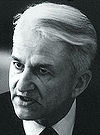 |
Richard von Weizsäcker Richard von Weizsäcker Richard Karl Freiherr von Weizsäcker , known as Richard von Weizsäcker, is a German politician . He served as Governing Mayor of West Berlin from 1981 to 1984, and as President of the Federal Republic of Germany from 1984 to 1994... (b. 1920) |
1 July 1984 | until 30 June 1994 |
CDU Christian Democratic Union (Germany) The Christian Democratic Union of Germany is a Christian democratic and conservative political party in Germany. It is regarded as on the centre-right of the German political spectrum... |
As President of the Bundesrat.
Presidents of the Saarland French protectorate
| Name | Term of Office | Party | |
|---|---|---|---|
| Peter Zimmer | 15 December 1947 | 1 January 1956 | SPS Social Democratic Party of Saarland Social Democratic Party of Saarland was a political party in Saarland.In 1935 a united front consisting of SPS and the Saar branch of the Communist Party of Germany was formed. The declaration of the front, issued on January 29, 1935, was signed by Max Braun on behalf of the SPS.Emil Kirschmann... |
| Heinrich Schneider | 2 January 1956 | 13 December 1956 | DPS |
Presidents of the German Democratic Republic
| # | Picture | Name (Born-Died) |
Term of Office | Party | |
|---|---|---|---|---|---|
| President (Staatspräsident) | |||||
| – | Johannes Dieckmann Johannes Dieckmann Johannes Dieckmann held the office of State President of East Germany on an acting basis in 1949 and again in 1960.... (acting) (1893–1969) |
7 October 1949 | 11 October 1949 | SED Socialist Unity Party of Germany The Socialist Unity Party of Germany was the governing party of the German Democratic Republic from its formation on 7 October 1949 until the elections of March 1990. The SED was a communist political party with a Marxist-Leninist ideology... |
|
| 1 |  |
Wilhelm Pieck Wilhelm Pieck Friedrich Wilhelm Reinhold Pieck was a German politician and a Communist. In 1949, he became the first President of the German Democratic Republic, an office abolished upon his death. He was succeeded by Walter Ulbricht, who served as Chairman of the Council of States.-Biography:Pieck was born to... (1876–1960) |
11 October 1949 | 7 September 1960 (died in office) |
SED Socialist Unity Party of Germany The Socialist Unity Party of Germany was the governing party of the German Democratic Republic from its formation on 7 October 1949 until the elections of March 1990. The SED was a communist political party with a Marxist-Leninist ideology... |
| – | Johannes Dieckmann Johannes Dieckmann Johannes Dieckmann held the office of State President of East Germany on an acting basis in 1949 and again in 1960.... (acting) (1893–1969) |
7 September 1960 | 12 September 1960 | SED Socialist Unity Party of Germany The Socialist Unity Party of Germany was the governing party of the German Democratic Republic from its formation on 7 October 1949 until the elections of March 1990. The SED was a communist political party with a Marxist-Leninist ideology... |
|
| Chairmen of the State Council (Vorsitzende des Staatsrats) | |||||
| 1 | Walter Ulbricht Walter Ulbricht Walter Ulbricht was a German communist politician. As First Secretary of the Socialist Unity Party from 1950 to 1971 , he played a leading role in the creation of the Weimar-era Communist Party of Germany and later in the early development and... (1893–1973) |
12 September 1960 | 1 August 1973 (died in office) |
SED Socialist Unity Party of Germany The Socialist Unity Party of Germany was the governing party of the German Democratic Republic from its formation on 7 October 1949 until the elections of March 1990. The SED was a communist political party with a Marxist-Leninist ideology... |
|
| – |  |
Friedrich Ebert, Jr. (acting) (1894–1979) |
1 August 1973 | 3 October 1973 | SED Socialist Unity Party of Germany The Socialist Unity Party of Germany was the governing party of the German Democratic Republic from its formation on 7 October 1949 until the elections of March 1990. The SED was a communist political party with a Marxist-Leninist ideology... |
| 2 |  |
Willi Stoph Willi Stoph Willi Stoph was an East German politician. He served as Prime Minister of the German Democratic Republic from 1964 to 1973, and again from 1976 until 1989.-Biography:... (1914–1999) |
3 October 1973 | 29 October 1976 | SED Socialist Unity Party of Germany The Socialist Unity Party of Germany was the governing party of the German Democratic Republic from its formation on 7 October 1949 until the elections of March 1990. The SED was a communist political party with a Marxist-Leninist ideology... |
| 3 |  |
Erich Honecker Erich Honecker Erich Honecker was a German communist politician who led the German Democratic Republic as General Secretary of the Socialist Unity Party from 1971 until 1989, serving as Head of State as well from Willi Stoph's relinquishment of that post in 1976.... (1912–1994) |
29 October 1976 | 18 October 1989 (resigned) |
SED Socialist Unity Party of Germany The Socialist Unity Party of Germany was the governing party of the German Democratic Republic from its formation on 7 October 1949 until the elections of March 1990. The SED was a communist political party with a Marxist-Leninist ideology... |
| 4 | 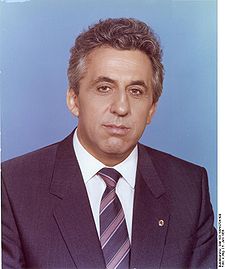 |
Egon Krenz Egon Krenz Egon Krenz is a former politician from East Germany , and that country's last Communist leader... (b. 1937) |
18 October 1989 | 6 December 1989 (resigned) |
SED Socialist Unity Party of Germany The Socialist Unity Party of Germany was the governing party of the German Democratic Republic from its formation on 7 October 1949 until the elections of March 1990. The SED was a communist political party with a Marxist-Leninist ideology... |
| 5 |  |
Manfred Gerlach Manfred Gerlach Manfred Gerlach was a German jurist and politician . He served as the acting Chairman of the Council of State and was thus head of state of East Germany from 6 December 1989 to 5 April 1990.-Early life:... (b. 1928) |
6 December 1989 | 5 April 1990 (office abolished) |
LDPD Liberal Democratic Party of Germany The Liberal Democratic Party of Germany ) was a political party in East Germany. Like the other allied parties of the SED in the National Front it had 52 representatives in the Volkskammer.-Foundation:... |
| President of the People's Chamber (Präsident der Volkskammer) | |||||
| 1 |  |
Sabine Bergmann-Pohl Sabine Bergmann-Pohl Sabine Bergmann-Pohl née Schulz is a German politician. A member of the Christian Democratic Union of Germany , she was president of the People's Chamber of the German Democratic Republic from April to October 1990 and as such the last head of state... (b. 1946) |
5 April 1990 | 2 October 1990 (office abolished German reunification German reunification was the process in 1990 in which the German Democratic Republic joined the Federal Republic of Germany , and when Berlin reunited into a single city, as provided by its then Grundgesetz constitution Article 23. The start of this process is commonly referred by Germans as die... ) |
CDU Christian Democratic Union (East Germany) The Christian Democratic Union of Germany ) was an East German political party founded in 1945. It was part of the National Front with the Socialist Unity Party of Germany until 1989.... |
As President of the People's Chamber.
As Deputy Chairman of the State Council.
List of Presidents of the reunifiedGerman reunificationGerman reunification was the process in 1990 in which the German Democratic Republic joined the Federal Republic of Germany , and when Berlin reunited into a single city, as provided by its then Grundgesetz constitution Article 23. The start of this process is commonly referred by Germans as die...
Federal Republic of Germany (BundespräsidentenPresident of GermanyThe President of the Federal Republic of Germany is the country's head of state. His official title in German is Bundespräsident . Germany has a parliamentary system of government and so the position of President is largely ceremonial...
) (since 1990)
| # | Portrait | Name (Born-Died) |
Term of Office | Party | |
|---|---|---|---|---|---|
| 6 |  |
Richard von Weizsäcker Richard von Weizsäcker Richard Karl Freiherr von Weizsäcker , known as Richard von Weizsäcker, is a German politician . He served as Governing Mayor of West Berlin from 1981 to 1984, and as President of the Federal Republic of Germany from 1984 to 1994... (b. 1920) |
since 1 July 1984 |
30 June 1994 | CDU Christian Democratic Union (Germany) The Christian Democratic Union of Germany is a Christian democratic and conservative political party in Germany. It is regarded as on the centre-right of the German political spectrum... |
| 7 |  |
Roman Herzog Roman Herzog Roman Herzog is a German politician as a member of the Christian Democratic Union, and served as President of Germany from 1994 to 1999... (b. 1934) |
1 July 1994 | 30 June 1999 | CDU Christian Democratic Union (Germany) The Christian Democratic Union of Germany is a Christian democratic and conservative political party in Germany. It is regarded as on the centre-right of the German political spectrum... |
| 8 | Johannes Rau Johannes Rau Johannes Rau was a German politician of the SPD. He was President of Germany from 1 July 1999 until 30 June 2004, and Minister-President of North Rhine-Westphalia from 1978 to 1998.-Education and work:... (1931–2006) |
1 July 1999 | 30 June 2004 | SPD | |
| 9 |  |
Horst Köhler Horst Köhler Horst Köhler is a German politician of the Christian Democratic Union. He was President of Germany from 2004 to 2010. As the candidate of the two Christian Democratic sister parties, the CDU and the CSU, and the liberal FDP, Köhler was elected to his first five-year term by the Federal Assembly on... (b. 1943) |
1 July 2004 | 31 May 2010 (resigned) |
CDU Christian Democratic Union (Germany) The Christian Democratic Union of Germany is a Christian democratic and conservative political party in Germany. It is regarded as on the centre-right of the German political spectrum... |
| – | Jens Böhrnsen Jens Böhrnsen Jens Böhrnsen is a German politician of the SPD. Since 2005, he has served as the President of the Senate and Mayor of the Free Hanseatic City of Bremen, that is, the head of government of the city-state of Bremen... (acting) (b. 1949) |
31 May 2010 | 30 June 2010 | SPD | |
| 10 | Christian Wulff Christian Wulff Christian Wilhelm Walter Wulff is the President of Germany and a politician of the Christian Democratic Union. He was elected President on 2010 and publicly swore the oath of office on . A lawyer by profession, he served as Premier of the state of Lower Saxony from 2003 to 2010.-Early life and... (b. 1959) |
30 June 2010 | Incumbent | CDU Christian Democratic Union (Germany) The Christian Democratic Union of Germany is a Christian democratic and conservative political party in Germany. It is regarded as on the centre-right of the German political spectrum... |
|
As President of the Bundesrat, Böhrnsen served as acting President following the resignation of Horst Köhler
Horst Köhler
Horst Köhler is a German politician of the Christian Democratic Union. He was President of Germany from 2004 to 2010. As the candidate of the two Christian Democratic sister parties, the CDU and the CSU, and the liberal FDP, Köhler was elected to his first five-year term by the Federal Assembly on...
.
See also
- List of German monarchs
- President of GermanyPresident of GermanyThe President of the Federal Republic of Germany is the country's head of state. His official title in German is Bundespräsident . Germany has a parliamentary system of government and so the position of President is largely ceremonial...
- President of Germany (Weimar Republic)
- Leadership of East Germany
- Chancellor of GermanyChancellor of GermanyThe Chancellor of Germany is, under the German 1949 constitution, the head of government of Germany...
- List of Chancellors of Germany

